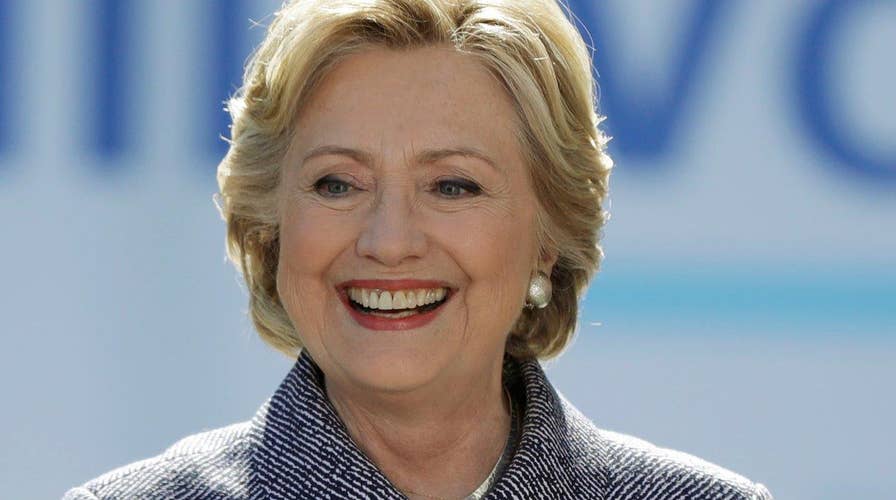Hillary Clinton has gained ground on Donald Trump, who has slipped in key measures of the presidential race after the first debate.
First, the horserace. Clinton is ahead of Trump by three percentage points: 43-40 percent in the four-way matchup, according to a new Fox News Poll of likely voters. Her advantage is within the poll’s margin of sampling error. Two weeks ago, Clinton was up by one (41-40 percent).
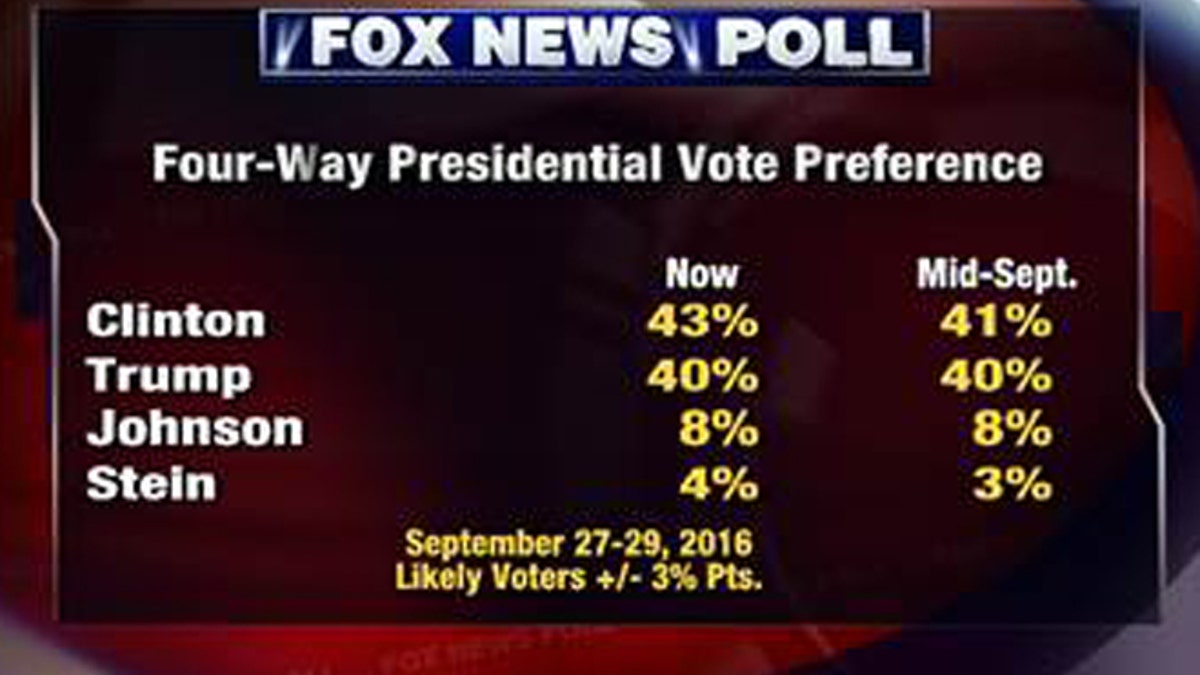
Third-party candidates Gary Johnson (8 percent) and Jill Stein (4 percent) remain in single digits.
In the two-candidate head-to-head, Clinton tops Trump by five: 49-44 percent. Two weeks ago, Trump was up by one (46-45 percent).
CLICK HERE TO READ THE FULL POLL RESULTS
The consequences of the debate, which voters score as a win for Clinton by nearly three-to-one, are even clearer on other measures. Trump’s honesty rating is down, most still say he doesn’t have the right temperament, and over half wouldn’t be comfortable with him as president.
Meanwhile, more voters now see Clinton as honest than Trump, the number who say she has the right temperament is up, and over half think her long tenure in government is a positive. Plus, her support increased among women, non-whites, and younger voters.
The poll was conducted Tuesday through Thursday, so all interviews were done after Monday night’s debate.
Trump is preferred among men (+17 points), whites (+21), and independents (+12). He’s narrowly ahead among whites with a college degree (+4 points), and has a wide lead among whites without a degree (+35 points).
Clinton leads among women (+20 points), non-whites (+66), and voters under age 45 (+8). She gained with each of those groups since the debate. Compared to two weeks ago, her advantage among women increased by 7 points, by 15 points among non-whites, and 8 among voters under age 45 (the candidates were tied in mid-September).
The candidates receive about equal backing from their party faithful: 83 percent of Democrats back Clinton vs. 81 percent of Republicans for Trump.
Independents favor Trump over Clinton by 41-29 percent, and 21 percent back Johnson.
Clinton’s backers (69 percent) are a bit more likely than Trump’s (64 percent) to say they “strongly” support their candidate.
What’s motivating voters? Fifty-seven percent say fear that the other candidate might win is behind their choice. For 39 percent, it’s enthusiasm for their candidate.
Trump’s supporters (60 percent) are more likely than Clinton’s (52 percent) to be motivated by the fear factor. This could help Trump. “Research shows fear is the most powerful emotion when it comes to turnout,” notes Republican pollster Daron Shaw. “Hope and anger also cause higher turnout, but fear really gets people to the polls.” Shaw conducts the Fox News Poll with Democratic counterpart Chris Anderson.
The big challenge for Trump: just 43 percent of likely voters would be at ease with him as president, while 50 percent would be comfortable with Clinton.
Indeed, nearly half say they would be “not at all” comfortable with Trump in the White House (47 percent).
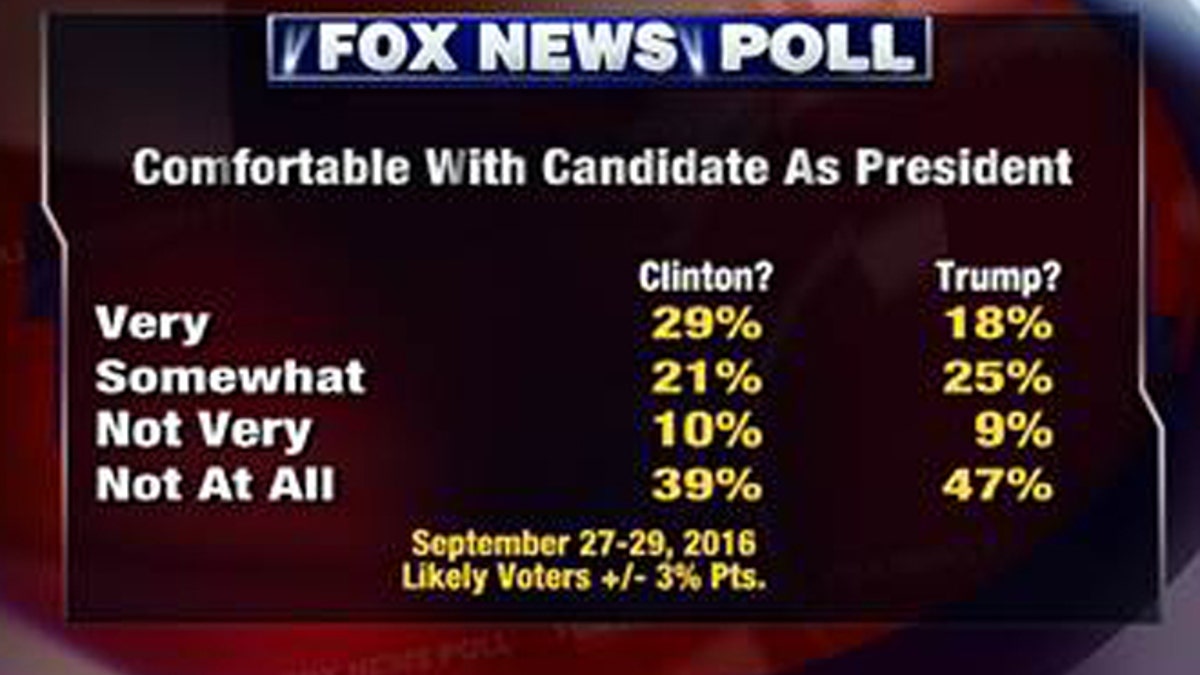
That’s unsurprising given 59 percent feel the real estate mogul lacks the temperament to serve effectively as president. By comparison, 67 percent say Clinton has the right temperament -- a notable improvement from 59 percent before the debate.
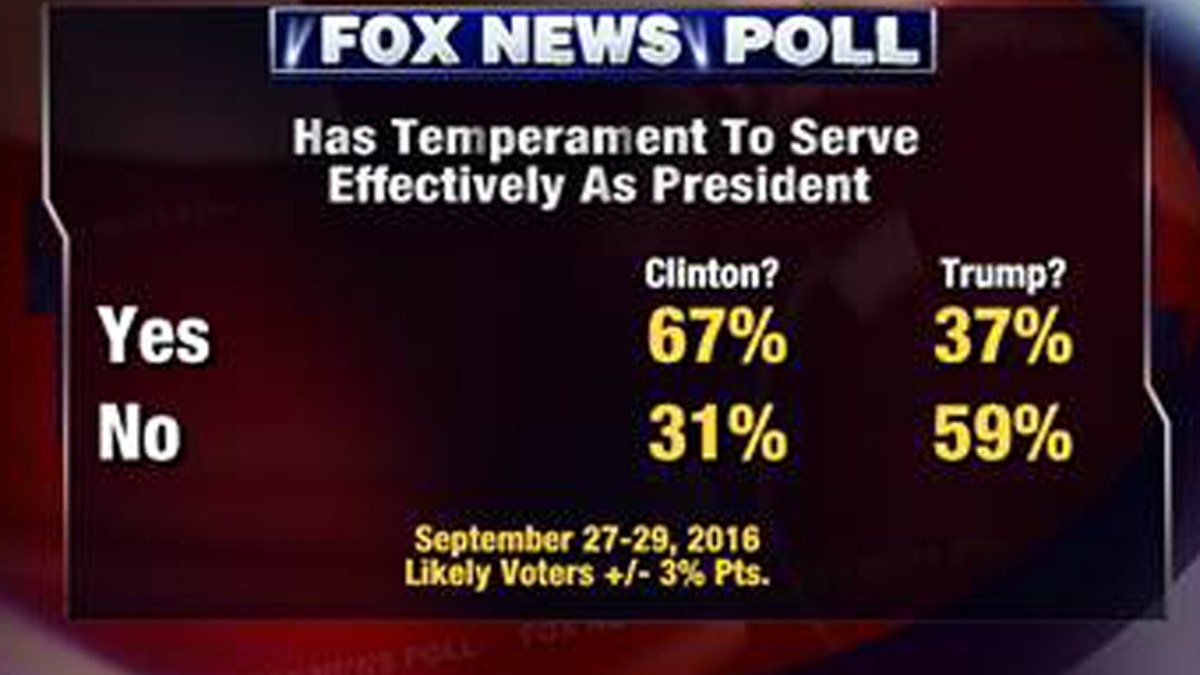
In the debate Trump repeatedly attacked Clinton for being in government for years and accomplishing little. Yet by a 13-point margin, voters see her years in office as a positive, while by a four-point margin they think it’s a bad thing that he’s never been in government.
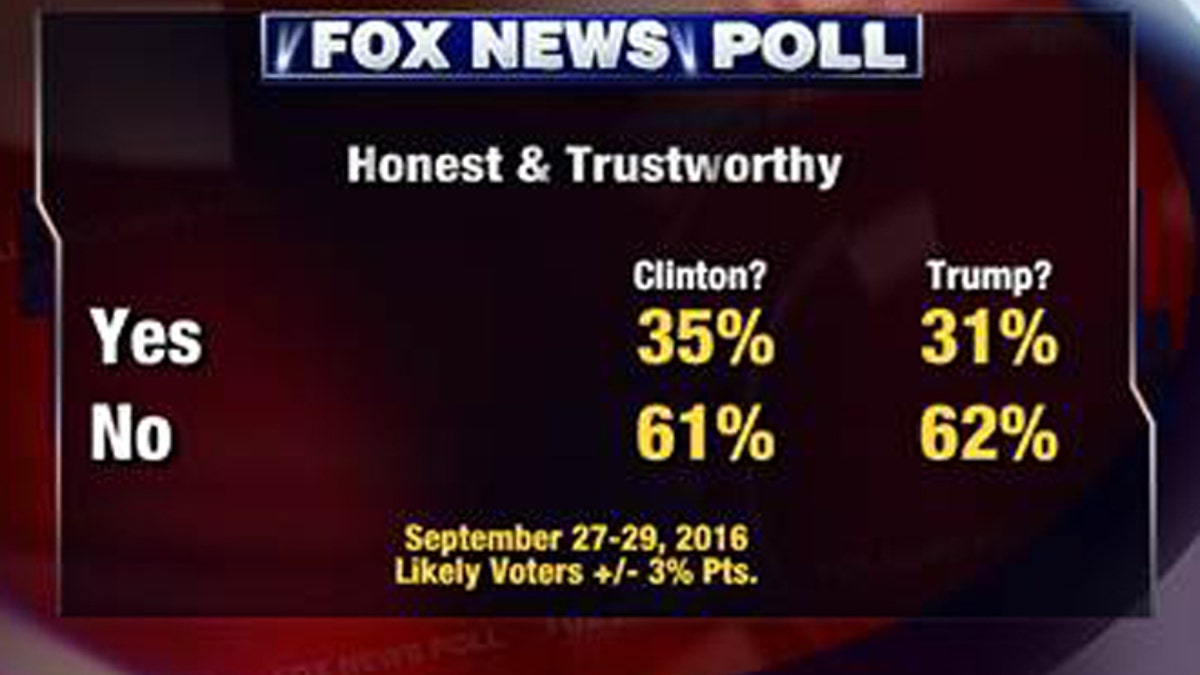
In addition, the number that believes Trump is honest and trustworthy is down 8 points since mid-September: 31 percent vs. 39 percent. At the same time, Clinton has mostly held steady on this measure: 35 percent now vs. 34 percent two weeks ago.
Both candidates remain largely unpopular: 53 percent have an unfavorable opinion of Clinton, and 55 percent view Trump negatively.
The number one quality voters want in a president is “good judgment in a crisis.” Twenty-six percent say that’s most important, while 18 percent want “a strong leader;” 15 percent want a candidate who “can bring about change,” and 14 percent say someone who “cares about people like me.” Another 13 percent want someone who “tells it like it is” and 12 percent say someone with the “right experience.”
Clinton leads among voters prioritizing judgment (+35 points) and empathy (+22). Trump is ahead among those wanting change (+45 points) and a strong leader (+4).
Likely voters trust Clinton over Trump on foreign policy (+24 points), immigration (+4), terrorism (+3), and crime (+2). More trust Trump on corruption in government (+5) and the economy (+2).
Pollpourri
Nearly three times as many registered voters who watched Monday’s debate say they “honestly think” Clinton won: 61 vs. 21 percent Trump. Twelve percent call it a draw.
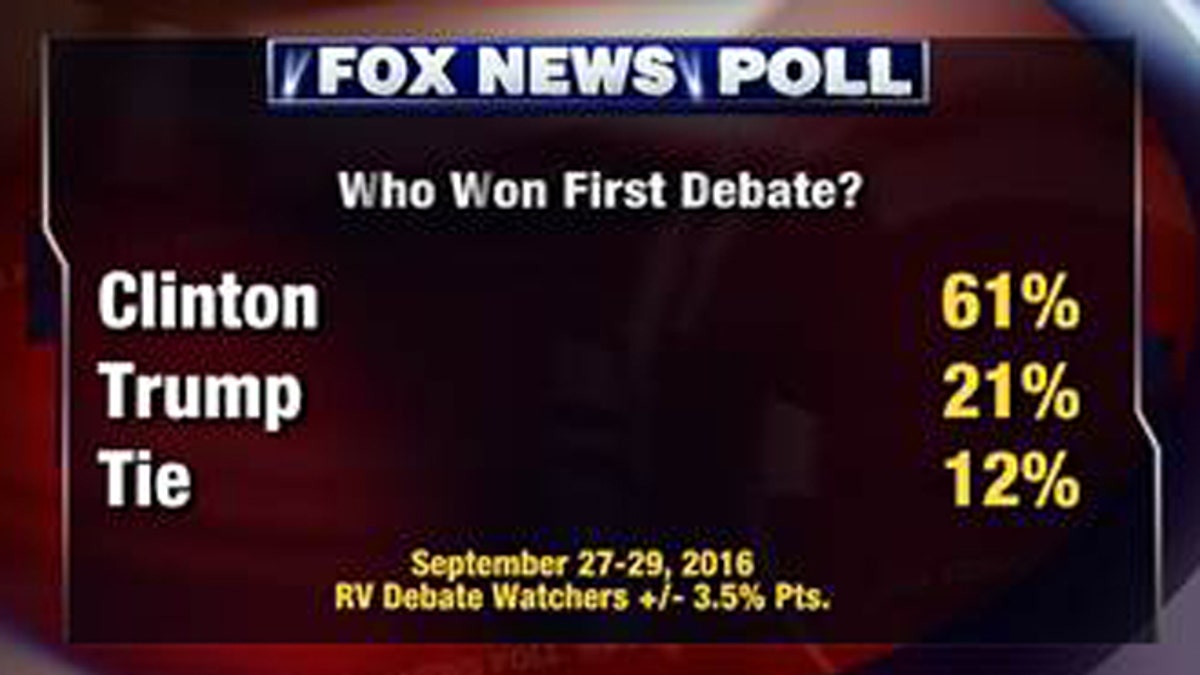
The poll also asks them to look into their crystal ball about November: 58 percent of registered voters think Clinton will win. That’s a 12-point increase from 46 percent who felt that way in June. Fully 90 percent of her supporters think she’ll be the next president. Far fewer Trump supporters, 66 percent, are confident he’ll win.
Post-election preview: If their candidate loses, 34 percent of Trump’s supporters and 19 percent of Clinton’s say they won’t accept the election outcome.
President Obama’s approval rating has been at 50 percent or higher since early June. Currently 51 percent of registered voters approve of the job he’s doing, while 46 percent disapprove.
Only 19 percent approve of the current Congress. Nearly three quarters disapprove (74 percent).
Forty-one percent of registered voters think life for the next generation of Americans will be better than life today. That’s up from 36 percent in May. Slightly more -- 43 percent -- expect life will be worse for the next generation, down from 51 percent.
Those who think life will be better are much more likely to back Clinton, while those who think it will be worse go for Trump.
The Fox News Poll is based on landline and cellphone interviews with 1,009 randomly chosen registered voters nationwide and was conducted under the joint direction of Anderson Robbins Research (D) and Shaw & Company Research (R) from September 27-29, 2016. The survey includes results among 911 likely voters. The margin of sampling error is plus or minus three percentage points for results among both registered and likely voters.




















